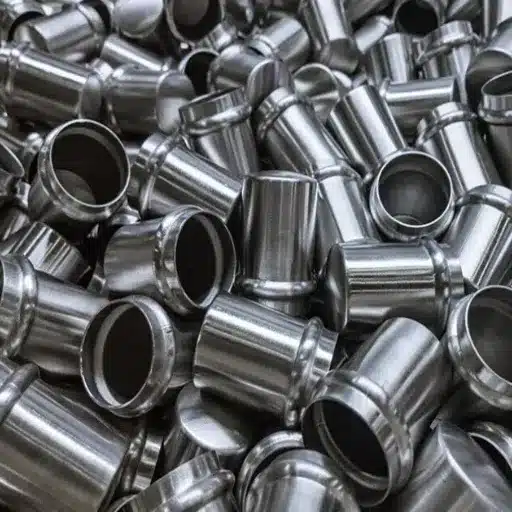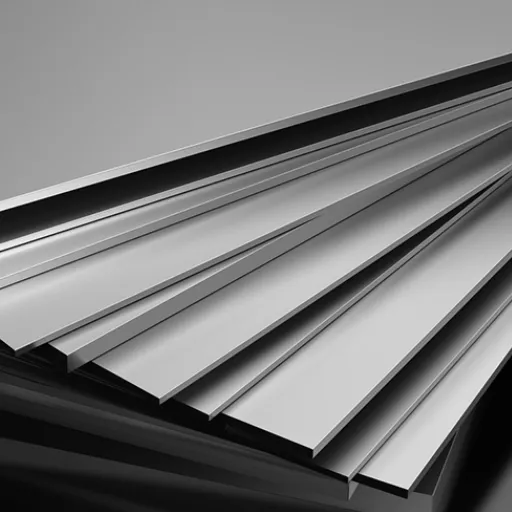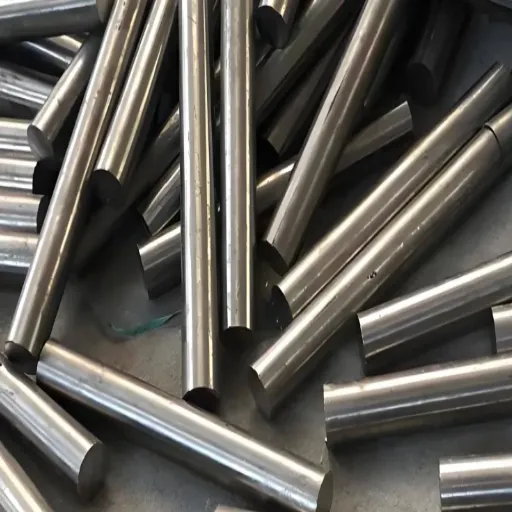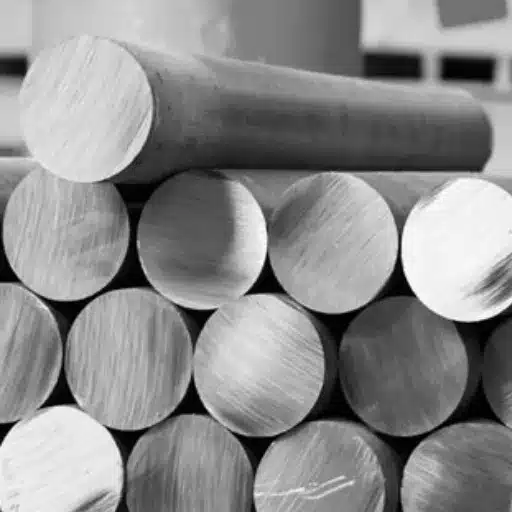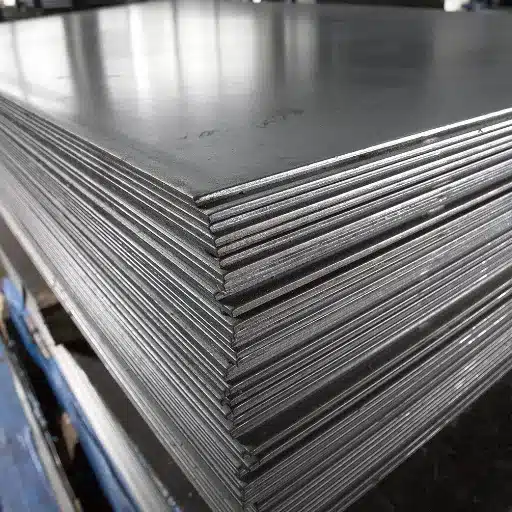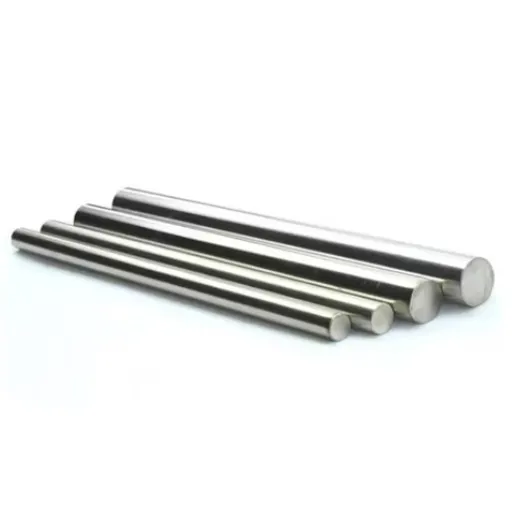The nickel alloy round bar is often applied in diverse industries. This is because the tube is highly efficient, strong, and resistant to extreme weather conditions, among other qualities. These channel rods are essential in the building of different aspects of the world’s industries today, such as aerospace and marine, among others. So, why is this metal alloy bar, especially a nickel alloy bar, so concerned? This essay will describe the notable characteristics of the nickel alloy round bar material, its effective application, and explain why engineers and technocrats so favor it. In the following paragraphs, the unique characteristics and benefits of such outstanding material will be discussed.
Introduction to Nickel Alloy Bars
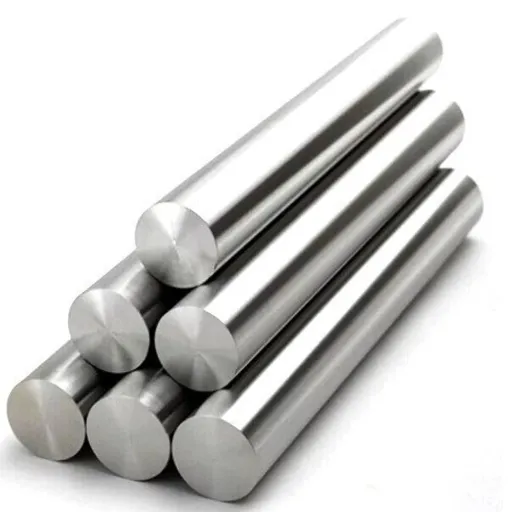
What is a Nickel Alloy Bar?
There is a kind of nickel alloy bar which contains a lot of, as it were, metals like chromed iron, molybdenum, and copper. The producers of diesels increase the heat-resistant properties of these structures and give them other uses. Nickel alloy products are widely used in various industries functioning in harsh environmental conditions due to their useful properties.
Each nickel alloy bar has a specific grade, in which the nickel content in the bar may range from 30% to 99%, depending on the degree to which the alloy is required. For instance, a Ni-Cr-Mo-Nb-based superalloy designed as alloy 718, this superalloy is a high-temperature and oxidation-resistant material. Monel 400 is an example in point. It is an alloy that has more than two metals, namely nickel and copper and it is this property of marine corrosion that makes it popular.
Based on some contemporary information, the remarkable toughness as well as temperatures of functioning of some of these nickel alloys are unambiguously indicated, since some of these alloys do not lose their fundamental qualities within the limits starting from 0 degrees Kelvin and more than 1200°F. The high weldability and machinability of nickel alloys further make it the material of preference to any kind of improvement.
Nickel alloys are known for their easily operable features, and this makes it hard to completely revert to using a lower strength material and avoid using a nickel alloy bar for existing or new strong constructions, especially for high-end aerospace materials or the like.
Composition and Types of Nickel Alloys
Nickel-based alloys owe their primary composition to nickel, overwhelmingly more than 50 percent in most cases, together with some other chemical, normally chromium, iron, particles of molybdenum, or, more uncommonly, copper or cobalt. These added obstacles ensure the existence of the desired properties such as wear, corrosion resistance or thermal and mechanical properties. They are known in general terms as nickel-bearing alloys and are conveniently divided into nickel-iron alloys, nickel-copper alloys, nickel-chrome alloys, and high-temperature nickel alloys, also termed superalloys.
- Nickel-Iron Alloys
Ni-Fe alloys such as Invar (also famously 36% of Ni and 64% of Fe) are indispensable where thermal expansion has to be controlled like in geographical metallurgy, precision measuring tools and boosers. - Nickel-Copper Alloys
The scope and converging retrogressions are given below to help you understand what to look for if nominated to supply a nickel alloy bar or matters of general interest. - Nickel-Copper Alloys
Alloys such as Monel (67 % nickel, 30% copper) are intensively used owing to their excellent corrosion resistance to seawater and high strength. They are widely employed in marine engagements, pumps, and even chemical processing units. - Nickel Chromous Alloys
Alloys like Nichrome, which consists of about 80 percent of nickel and 20 percent of chromium, are mostly known for their high resistance to electricity and temperature. In such a case, it is a part of the bar to use Nichrome in the heating elements of industrial as well as domestic appliances. - Superalloys
To provide maximum strength at high temperatures and excellent corrosion resistance, Nickel-rich superalloys with chromium, cobalt, and molybdenum are used. Such materials are mainly jet engines, gas turbines, or power stations, Hastelloy or Waspalloy, for instance. A good example is modern jet engines, where until 50%-60% of the mechanical parts of the engines contain nickel superalloys since these materials have been known to work very well even at extreme temperatures.
New Information and Progress
As expressed in a number of scholarly and industry papers, the production of nickel alloys is expected to rise modestly over the period 2023–2030, with a compound annual growth rate of 4.5 percent. The anticipated increase in demand is, to a large extent, attributed to the rise in consumption by the aerospace, automotive, and energy industries. Also, changes in the composition of the alloys have enhanced the ability to reuse nickel alloys, where some manufacturers can recycle up to 90% recycling, and this highlights the green aspect of these alloys.
Nickel alloys have been developed further in order to answer the next engineering problems, but they are still known as good and highly applicable materials in many industries.
Importance in Various Industries
The introduction of nickel alloys in industries such as aeronautics, power plants, nuclear energy, HVAC, automotive industries, and the health sector has increased the operating efficiency of these systems. Under extreme temperatures or severe conditions, corrosion of the components, especially the components that are engine wheels or covers of turbines coupled with the propulsion systems, cannot be ignored. Nickel superalloys, for instance, are used in aircraft engine turbines, and one of the geometries is the turbine blade as these alloys can withstand turbine operating temperatures up to 986°C for quite some hours. Current Forecast shows that the aerospace and defense equipment market will experience growth of 4% every year till 2030, and even right now, customers are already being hard-pressed into embracing the improvement of aero engines and their manufacture more cost-effectively because of the competition within the industry.
Nickel is not used for any of the nuclear or green power generation industries’ alloys, either. Such alloys are used in gas turbines, reactors, and solar energy power plants as they are resistant to heat and unaffected by oxygen. With the global market for clean energy expected to be worth 1.9 trillion dollars by 2030, the expansion of this sector will inevitably be a factor in the appeal of these materials. With the growth of the market, the industries are being encouraged by the cost of innovation, Epithelium, which is the cost of the processes necessary to transform a particular invention into marketable technology. This suggests that in order to achieve an optimal level of economy, firms tend to prefer reinvesting more as well as commercializing these superior materials. Design and production capacity. A static antimicrobial micro surface control primary nickel alloy bar items oblong in shape with advertising to gain local opportunities.
There is an intense use of nickel alloys also in the health-care industry in products like implants and in surgical tools. This is attributable to the favorable properties of nickel-titanium alloys – popularly called Nitinol – which include high biocompatibility and mechanical properties, making these alloys ideal in the design of stents, in orthodontic arch wires, and even in the replacement of joints. The need for each of these is rising with the rise of health care, which is estimated to be $12 trillion by 2023.
The versatility of nickel alloys, as well as many applications of nickel alloys, calls forth more inventions and enlargements in the market present. According to Allied Market Research, the current global nickel alloy market worth of $14.3 billion will grow to $17.2 billion in 2030 at a compound annual growth rate (CAGR) of 2.8% per year. This is a nickel alloy bar that is taking major roles in modern sciences as well as such nickel alloy materials for the environment.
Properties and Benefits of Nickel Alloy Bars
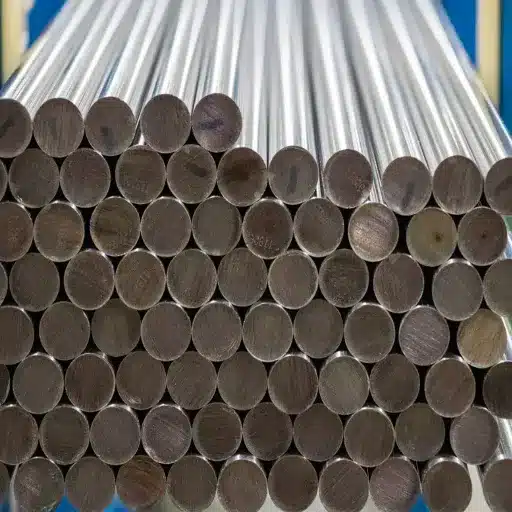
Corrosion Resistance
Nickel alloy bar is known to be long-lasting due to the fact that it is highly corrosion-resistant even at worst conditions. They are more likely to endure in the presence or destruction of acids or bases, and even salts. In a more recent publication on heat resistance of kinds of fittings, the Monel 400, Hastelloy C276, Inconel 625, and other nickel-based alloys are described in relation to their application to marine, chemical, and oil and gas installations due to nickel-based alloys being corrosion-resistant, pitting and crevice, and stress corrosion cracking-free.
For instance, these chemical tanks, partially made of Hastelloy C276, storm water outfalls shall be used in places where one deals with hydrochloric, sulphuric, or such acids that are very aggressive. In the same way, one of Monel 400 most significant materials contains about 70% nickel, which enables it to resist corrosion in seawater, hence making it suitable in naval components such as propeller shafts, pumps, and valves.
When it comes to the supply of nickel alloy bars, their share in the global market is expected to remain abundant as the demand for high-performing materials is set to increase, especially in some significant sectors. Current estimates reveal that, by 2028, there shall be an upsurge of over 4 billion dollars in the market for nickel-covered corrosion-resistant materials, due to the high usage and development of the nickel-based alloys in corrosion prevention in the respective industries that promote ‘wear’ and durability. It is to this extent that the materials can be useful in improving the safety, efficiency, and availability of design engineering solutions aimed at addressing current and beyond that sculpture their demand.
Strength and Durability
There is a growing demand for nickel˗based alloys, which are corrosion resistant and exhibit commendable strength in harsh conditions, thus are regarded as ideal. Arguably, such characteristics have contributed to the popularity of these alloys in various high-pressure fields with the oil and gas industry as well as the mentioned air and sea craft construction among them. In addition, the increasing application of these goods is made possible by the fact that the market for the nickel alloy bar alone is estimated to experience an annual increase in 3.2% between 2023 to 2030 since multi-million investments for energy and infrastructure formally took place.
Furthermore, currently used alloys that contain copper, iron, and nickel are known as Monel and Inconel. These alloy bases are known under different names as they are aimed at challenges that require reinforcement by heat and have aggressive conditions that frustrate weakened parts like brackets. Cost-benefit calculus of the inclusion of such alloys in machinery would show in the simplest analysis, avoidance of the spiraling operational costs that are incurred due to repair work, up to 50% more life span in machines employing these disgraceful practices caused by the exhaustion of wear-resistant materials. This duality of nickel alloy bar and sheeting strengthening W-resistance to corrosion has been a significant factor of production of water wagons for construction for quite some time, particularly as market players at the smart age seem to be more keen on deferring the risk-taking costs and even resources, bridges, and standings over tested and proven means.
Versatility in Extreme Environments
It is well known that Nickel based corrosion resistant alloys over a wide range of temperatures are generally recognized as useful. These materials are built for the abuse and punishment of elevated temperatures, aggressive chemicals, and pressure where they are utilized both in oil and gas industries, chemical and aerospace industries to shipping industries, and many others.
The need to use tools and materials is sometimes needed in temperature more than 1000°F (537°C), where they are under thermal stress while strong them maintainability. For instance, the offshore installation pipes in deep-sea oil and gas production use a nickel alloy bar that prevents losses caused by crevice and pitting from seawater and hydrogen sulfate. Furthermore, considering the industry records, the use of such tools and machines has reduced failure cases and performed operations by over 60%.
In addition, some studies inform that the existence of some nickel metal alloys like Hastelloy®, Inconel®, or Monel®, which don’t corrode under pH 3 acidic circumstances hard to achieve, providing their long life span. This is why acids are dangerous for many industries that control them in bulk size, such as the specific steel industry, where weathering is included. Those vessels or tanks are lined with these materials within the plants or factories that make or process chemicals like sulphuric acid and hydrochloric acid. It may not exist, though, because a nickel alloy bar intended for incorporation in some parts necessary for reliability and which has the capability of tensile strength, unlike one composed entirely of iron and copper, is oxygen-tolerant and requires no finishing post-weaving.
Industrial Applications of Nickel Alloy Bars
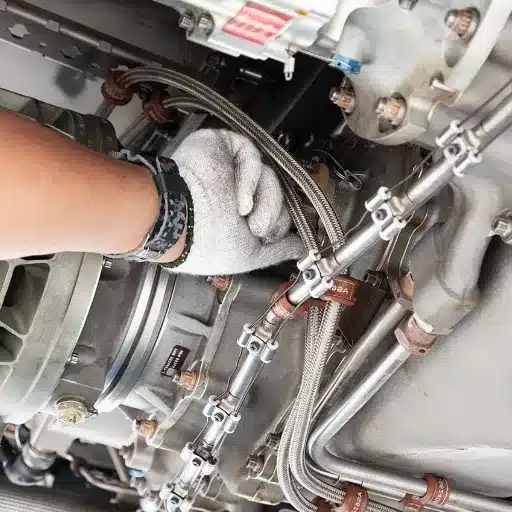
Aerospace Industry
In aerospace, the nickel alloy bar is quite popular and indispensable, given its suitability to withstand even the most extraordinary conditions – heat and corrosive agents. They are applied, and in the midst of other things, they may even include production of jet engine components, turbine fins, and rocket engines. For example, Inconel 718 is extensively employed in many areas because it is capable of functioning at temperatures ranging from -253 °C to 704 °C.
Research on the increase of nickel alloy component demand in the aircraft industry shows that the trend has been increasing for several years now. It is also projected to rise over the forecast period at a rate of 6.4% per annum. The prospects of developing the aircraft industry are determined by the ever-increasing market for light planes and cost savings in terms of fuel consumption. For example, weight reduction can be done with the aid of composites and nickel alloys as they are designed with the same in weight. Another advantage is that the nickel alloy bar offers more resistance to wear, which lowers the cost of replacement or maintenance, which is a fact in aviation very much secure.
Automotive Sector
The significance of the nickel alloy bar has been paramount, in the automotive sector, more so in keeping up with the optimizing demands, even as there are already electric and hybrid vehicles in stock, whose growth has no healthy looking end. Materials such as nickel steel tend to be heavier and more uplifting devices, where other materials, especially where emission levels have significantly reduced, and materials and processes have become environmentally friendly. Whereas there is full treatment, it will be imperative to use these bars on the turbo, the exhaust, and on the battery casing as these tenders are strong, heat-resistant, and corrosion-proof.
A survey of different countries indicates that the market size of nickel alloy bars for automotive applications will grow by 5.2% annually until 2023-2030. This can be partially explained by the periodic shocks due to the increasing demand for horses that are smaller in size/consumes less fuel. For instance, the higher energy density provided by the nickel alloy substantially improves an EV battery’s life, which allows the EV. Moreover, nickel alloys are crucial in the internal combustion engines used in vehicles equipped with superchargers, as the weight of the engine remains unchanged and does not compromise on safety or performance.
Chemical Processing
Nickel alloys are vital in the chemical processing industry primarily because they resist corrosion, remain strong at elevated temperatures, and remain intact in harsh environments. The above features make nickel and its alloys the most suitable materials for making pipes, valve components, heat exchangers and reactor vessels that are subjected to tough conditions and high temperatures. In relation to statistics from the industry lately, the global market of processing chemicals tends to use, to a great extent, nickel and its alloys and the need for such materials is projected to increase at a 5.8% compound annual rate from the year 2023 to the year 2030.
For instance, an excellent example can be found in chemical industries where the use of corrosion-resistant materials to specific chemicals, acidic or alkaline in this case, is very practical, especially with the presence of nickel alloy bars in material construction as opposed to the ordinary grade base metals and alloys, among such well-known products, including Monel and Hastelloy. As a result, operations are able to be carried out safely, cost-efficiently, and with minimum wear of the equipment and corrosion downtime. Also, the thermal conductance of nickel is greater, making it a heat exchanger material, causing more efficient utilization of energy in chemical/engineering operations. Such a component’s importance is not only the improvement of chemical processing plants but also the introduction of more sustainable practices in the industry.
Marine Engineering
Ni has multipurpose uses in marine engineering due to its anticorrosion and saltwater-tolerant properties. Navigating vessels, both surface-level and submersible, as well as platforms for the extraction of oil from the sea, and even some plants for the conversion of saline water to potable water, are all seaborne operations, or coastal, and such operations lead to the deterioration of materials found rather quickly by the action of seawater and salty air, among other environmental forces. That is why the incorporation of materials like nickel alloy bar alloys, for instance, steel, stainless, or Monel in other cases has proved to be not only possible, but vital.
The global marine corrosion industry is estimated to be valued at over $50 billion annually as most cases involve equipment exposure to saltwater and the associated damage. Much of this loss can be avoided by nickel-rich alloys, which are also found to boost the performance of the equipment. Take, for example, a nickel alloy bar of UNS N08825, which resists pitting and crevice attack in systems using seawater and therefore finds application in heat exchangers and pipework for the marine environment.
Along with everything that has already been stated, advancements in technology within the scope of the application of the nickel alloy bar have enabled the light, strong, and efficient marine structures for the forest industry. As an example, propellers for ships are increasingly cast from high-strength alloys of nickel-aluminum bronze, which minimizes fouling and erosion due to cavitation. The following expansion of the field provides evidence that nickel may play a relevant role in improving performance and eco-friendliness in the maritime sector.
Choosing the Right Nickel Alloy Bar
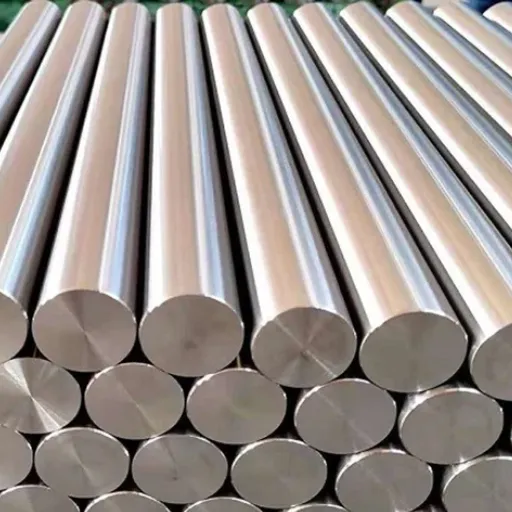
Factors to Consider
These are only a few important issues that ought to be taken into account when choosing a particular nickel alloy bar to achieve practical results economically:
- Corrosion Resistance
The metals used in nickel-based alloys are in most cases, very active and thus provide very high performance in corrosive environments. Particularly, nickel-chromium alloys, for example, Inconel, do not suffer oxidation even at elevated temperatures in corrosive environments, as is the case in chemical engineering and marine applications. In recent years, it has been noted that huge amounts of money have been lost every year across industries due to corrosion damage, thus negating the pattern of requiring corrosion-free materials - Strength and Durability
The scope of the alloy’s mechanical features hinges on the purpose of its usage and the underlying need. High-strength alloys like Monel 400 exhibit very high tensile strength, and their use can be appreciated in aerospace as well as oil and gas applications. Study results indicate that Monel 400 exhibits the greatest tensile strength of about 620 MPa and the least at 550 MPa, thus making it suitable for application in high-stress environments. - Thermal Compatibility
Such components requiring both heat resistance and elevated temperature stability should utilize nickel alloys such as Hastelloy or Nimonic. These alloys have been reported to maintain high standards of mechanical and oxidation resistance even at temperatures as high as 2,000F, a feature that is critical to the design of gas turbines and heat exchangers. - Ability to cut and shape
One more benefit of Nickel 200 is that it is quite easy to machine and shape, thanks to its high ductility. Therefore, the cost and time needed for producing a nickel alloy bar, too, may ease or vice versa, depending on the specific case of when it is worked upon and formed into the finished product. - Price and the Cost of Stock
The global availability of nickel varies, so there could be variations in its cost up or down. It is argued that nickel in 2023 averaged at around $22,000, and there lies the achievement of the desired performance in such a way that the wished-for performance does not increase the cost.
Given the need to make appropriate choices as regards nickel alloy bars with optimal design and strength, considering cost is vital while fulfilling the given requirements for the present project.
Temperature Resistance
Nickel alloys, today, occupy a big part in the manufacture of the high-temperature systems of the aerospace industry, electrical power plant and the chemical industry. Such high-temperature nickel alloys like Inconel 718 have been designed to operate without loss of mechanical performance and oxidation at temperatures in excess of 1300°F / 700°C. This is why superalloys, more specifically nickel alloy bar and other products, hastelloy X is used in the gas turbine sector since it is able to sustain up to 2000°F / 1093°C without collapsing.
Review of engineering history demonstrates that Nickel alloys are effective to frequent changes of temperature. Examples of such metals include Monel, Nimonic, Waspaloy, etc., which in a materials performance report 2023 will be reported to contain the ability to exhibit extraordinary creep resistance, thermal fatigue and consequently extend the service life of the equipment in a harsh working environment. This also makes them perfect for high-temperature heat exchangers, boilers, and even exhaust systems.
Apart from the durability properties, several other advantages accrue to the industries that require nickel alloy bar molds due to high temperatures. There is the fitness and security in industrialization, which gets quite extreme, that is made possible by the absence of thermal contraction and rust, even though the temperatures are really high.
Tensile Strength and Cost Considerations
Nickel alloys are employed for their incredible tensile strengths that allow the alloys to support heavy mechanical loads without distortions. The strongest tensile strength is that of the most nickel alloy bar, for example, Inconel 718, which is around 1410MPa (205,000 psi) in the tensile load. As you know, this property is advantageous for building structures in the aerospace industry and also the energy industry. Thus, most of the components will work fine under the stress put on them and will retain their original shape.
Nickel, being far more refined than basic metallic substances such as stainless steel or iron, requires more resources and time to fashion into usable shapes, thus costing more. Today, the prices of nickel in tonnage, for that matter of October 2023, indicate a dollar value of $20,600, which means an addition to the base figures of such prostheses. On the other hand, the said nickel-alloy-feathered elements appear as cost components which may not be as pronounced as indicators, as there are fewer spare parts replacements required in cases of aggressive functioning over a short period of time. Consequently, the advantages and risks associated with the use of ordinary nickel alloys depend on the particular contexts of their application, although they do not restrain the utilization of these materials in costly and nerve-racking conditions. Consequently, the use of a nickel alloy bar has its own significance when one needs to deliver appropriate police records under high temperature, highly corrosive, and generally aggressive conditions of service.
Reference Sources
-
Global Market Insights
- Title: Nickel Alloy Market Size and Share | Industry Statistics
- Description: This source highlights the industries that prefer nickel alloys, such as aerospace, power generation, and chemical processing, emphasizing their use in extreme temperature environments.
- Link: Global Market Insights
-
Data Bridge Market Research
- Title: Global Nickel Alloy Market Size, Share, and Trends
- Description: This report provides insights into the market size, growth trends, and key industries utilizing nickel alloys, including projections for future demand.
- Link: Data Bridge Market Research
-
Grand View Research
- Title: Nickel Alloys Market Size, Share | Industry Report
- Description: This source discusses the growth of the nickel alloys market, particularly in the aerospace industry, and its applications in jet engines and other high-performance areas.
- Link: Grand View Research
Frequently Asked Questions (FAQs)
Why is Nickel Alloy employed in Round bar?
Versatility is what round bars made out of nickel alloys provide in general, giving them credence for application in most industries due to higher strength, temperature retention, and corrosion resistance. Aerospace sector, marine equipment, power generation plants, chemical equipment, energy extraction pipes, and many others are some areas of application. That is to say, corrosion resistance and strength of these materials recommend them for use in critical structural and other high-performance applications.
What are the reasons for the versatility of Nickel Alloy Bars?
The ease of functionality, more than anything, defines an alloy nickel bar as versatile as it manages to serve well even in multiple challenging situations. Its structure does not weaken with heating. It does not get corroded by acid, salt or moisture. Additionally, each nickel alloy bar can be shaped into very intricate geometries and inches, which extends the scope of possible applications of the completed product beyond existing limits.
How can the use of Nickel Alloy Bars help in minimizing operating costs?
Even though nickel alloy bars may be far more costly to buy than regular metals, their efficiency and durability outperforming that of rivals is often achieved at a lower cost. This is in the sense that the equipment service life increases due to high performance, which saves on the costs of repairs and replacements, which would otherwise be done repetitively. In addition, their inherent ability to resist corrosion also contributes to the reduced use of resources such as manpower and money for servicing due to the reduced frequency of such an activity.
Is it feasible to make use of Nickel Alloy Bars in the Marine Environment?
Yes, a nickel alloy bar opened is completely fine for use in the construction of maritime. The entire functioning of such environmental systems takes place in waters where the concentration of salts or reds and other comparable compounds is increased, leading to wear and tear of such systems being much greater. Much of the protective drying cycles involves the use of nickel and other alloys to change those processes. These strong buildings are very precise in their performance and objective, which are interesting for shipbuilding, offshore building, and marine equipment.
What are the factors influencing the cost of Nickel Alloy Round Bars?
There are a variety of factors that affect the cost of the nickel alloy round bars, and these may include: the market price of nickel, the alloy composition, and even the agile manufacturing processes. For example, when nickel prices reached their highest at $20,600 per ton in October 2023. In addition, there is also a cost factor associated with machining, whereby the right alloy needs to be sourced and prepared. In any case, nickel alloy bars are seen to be costly but are justified due to their durability and performance effectiveness.
How are the Nickel Alloy Bars fabricated?
A nickel alloy bar is constructed by several procedures, including high-precision alloying, forging, and machining. The process commences with the melting of the required amount of nickel and other alloys, such as possibly chromium, molybdenum, or iron in order to attain the properties sought. Then the cast alloy is processed into round rods, which are then subjected to several heat and machining treatments to ensure the final properties necessary for the product in question. Such an elaborate process ensures the manufacture of highly efficient goods with the correct purpose and specifications that are ready for use.

